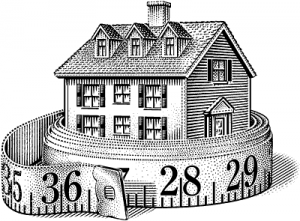As we all know, Shakespeare was a fantastic wordsmith, utilizing countless puns and inventing new words that we still use today. Because of these feats, when a peculiar word pops up in one of his plays, scholars jump at the chance to figure out what it means. I talked about one such Italian word from Troilus and Cressida last week, and it turns out that seemingly out of place words are a trend in many of Shakespeare’s plays.
In Measure For Measure, Elbow refers to brothels as “common houses,” a phrase that does not really occur anywhere else in contemporary literature of the time (2.1.43). As Kenji Go of Teikyo University points out, many wondered “if Shakespeare was coining a new euphemistic phrase for brothels” (Go 191). This assumption was brought about in no small part due to the fact that the Oxford English Dictionary cites Measure For Measure as the first and only time the phrase was used to refer to a brothel (Go 191). As much as we all would love to give credit to Shakespeare for inventing a phrase that simply did not catch on like many of his others, Go argues that Shakespeare did in fact borrow common house from another work. Go refers to the second Book of Homilies, a compilation of sermons created by the Church of England, which was written around 1563 and refers to brothels as common base houses, emphasizing the degrading nature of these establishments (Go 192). While it is not the exact same phrase, Go points out that Shakespearean audiences would have been familiar enough with the text to pick up on a near reference.
While the origin of this particular phrase may not seem like such a big deal, it actually adds to Elbow’s humorous nature as he utters “a whole series of ill-chosen words, all of which were supposed to sound hilariously amusing on stage” (Go 193-194). If this is the case, then using a euphemism for brothel that originated in a text from the Church of England would have added a significant layer of humor to audiences who were “familiar with [the phrase] through the voices of their parish ministers” (Go 194). This connection also ties in issues of religion and morality into the scene, which play significant roles in the comedy as a whole.
Shakespeare commonly quoted specific texts in his plays to add relevance and meaning, so it is by no means a stretch to say he intentionally referenced the Book of Homilies in this particular instance. Incorporating a phrase that connotes the strictness of religion specifically rooted in England strengthens the play’s connection to the current issues in which Shakespeare was living. The fact that Elbow misquotes the phrase, in a sense, only adds to the hilarity and his character, who is seen as dim-witted and often functions as comic relief. To call a brothel a common house evokes the concept of traditional morality and a lack of understanding of said morality simultaneously. It ties in perfectly well into the play and is the perfect balance of poking fun at an aspect of society while maintaining necessary subtlety that Shakespeare is known for.
Citations:
Go, Kenji. “On the Origin of the ‘Common Houses’ as Brothels in Measure for Measure.” Notes and Queries 55.2 (2008): 191-4.ProQuest. Web. 10 Aug. 2015.
Shakespeare, William. “Measure For Measure.” The Complete Pelican Shakespeare. Eds. Stephen Orgel, and A R. Braunmuller. New York, NY: Penguin Books, 2002. 532-564. Print.


